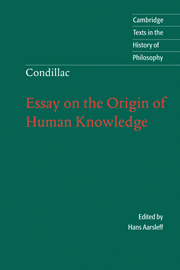Book contents
- Frontmatter
- Contents
- Acknowledgments
- List of abbreviations
- Introduction
- Chronology
- Further reading
- Note on the text and translation
- Essay on the Origin of Human Knowledge
- Introduction
- PART I The materials of our knowledge and especially the operations of the soul
- PART II Language and method
- Section 1 The origin and progress of language
- Section 2 Method
- Index
- Cambridge texts in the history of philosophy
Section 2 - Method
Published online by Cambridge University Press: 05 June 2012
- Frontmatter
- Contents
- Acknowledgments
- List of abbreviations
- Introduction
- Chronology
- Further reading
- Note on the text and translation
- Essay on the Origin of Human Knowledge
- Introduction
- PART I The materials of our knowledge and especially the operations of the soul
- PART II Language and method
- Section 1 The origin and progress of language
- Section 2 Method
- Index
- Cambridge texts in the history of philosophy
Summary
It is from the knowledge we have gained of the operations of mind and of the causes of their progress that we must learn how to conduct ourselves in the search for truth. Before we arrived at this point we could not conceive of a good method, but now it actually seems to reveal itself as a natural consequence of our researches. It will be sufficient to enlarge upon some of the thoughts that occur in this work.
The first cause of our errors and the origin of truth
§I Many philosophers have eloquently told us about the large number of errors we attribute to the senses, the imagination, and the passions; but they cannot flatter themselves that their works have produced all the benefits that were promised in those works. Their very imperfect theory is ill qualified to instruct us in practice. The imagination and the passions work in such intricate ways and depend so much on people's temperaments, on times and circumstances, that it is impossible to discover all the springs they set in motion, and, by the same token, they make it natural for everyone to flatter himself that he is not among those they have led into error.
Instead of quitting its errors, often the mind merely takes up new error, much like an ailing person who recovers from one illness only to contract a new one.
- Type
- Chapter
- Information
- Condillac: Essay on the Origin of Human Knowledge , pp. 196 - 220Publisher: Cambridge University PressPrint publication year: 2001



